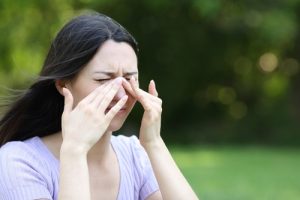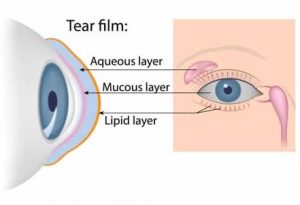Do your eyes feel dry, irritated, or watery? These are often symptoms of a chronic eye condition called dry eye syndrome.
When your eyes feel dried out, it can be very uncomfortable. The primary symptoms of dry eyes are burning, stinging, and feeling like there’s grit in your eyes even when they’re clean.
Your eyes can become too dry for a variety of reasons. Anything that affects your tear production can leave your eyes unable to produce enough tears or tears that have the proper nutrients.
Certain environmental and temporary factors may make your eyes too dry, but they can also become dried out due to a chronic condition. You often need to consult an eye care professional to determine what’s causing your dry eyes.
But to get started, you can look into the most common reasons why your eyes may feel drier than they should. Keep reading to discover 5 reasons your eyes may feel dry and irritated.
1. Too Much Screen Time

Electronic screens emit a particular wavelength of light called blue light. Blue light can irritate your eyes, as direct exposure can make your eyes feel dry.
It can also cause eye strain, fatigue, and headaches. When looking at a screen, you tend not to blink as much.
Blinking is how your eyes stay properly lubricated, so it can make your eyes feel too dry when you don’t blink enough.
If you spend a great deal of time on the computer or your phone, consider switching to a warm light mode. This setting is available on many phones and computers and minimizes the blue light the screen emits.
But you should also take regular breaks from the screen. If you need to be on a computer all day for work, you can still take small breaks by following the 20-20-20 rule.
This rule states that every 20 minutes you’re on the computer, you should take a break for 20 seconds to look at an object 20 feet away. This small break reminds you to blink and refocus so your eyes can get enough moisture and refocus.
2. Air Conditioning

Dry air can dry out your eyes very quickly. Some may only see this as an issue if it’s winter or you live in a dry area.
But during the hot months of the year, most people have the driest homes and offices because they have the AC on. Sitting by an air vent for an extended time or sleeping near one can dry out your sinuses and your eyes.
Try to minimize this effect by avoiding AC vents when you can, and consider using a humidifier in your home or office. Do your best to avoid sitting directly underneath these vents to give your eyes a break.
3. Not Enough Water

Dehydration affects your whole body, including your eyes. If you aren’t getting enough water by drinking it, your eyes can’t produce a sufficient amount of water to keep your eyes hydrated and functioning as they should.
Do your best to stay hydrated all year by drinking enough water and electrolyte-rich fluids. The more hydrated you are, the better you’ll feel and the more moisture your eyes have to work with. Consider eating foods with higher water content, like cucumbers, watermelon, or celery, if drinking water isn’t doing enough.
4. Allergy Season
Allergic conjunctivitis, or eye allergies, is distinct from dry eyes. But if you have a pollen allergy, as many people do, the springtime may make your eyes feel especially dry and irritated.
Allergic conjunctivitis exacerbates existing dry eye symptoms. Both dry eyes and allergic conjunctivitis result from inflammation, so if your eyes are dry, allergies can make them feel more irritated.

You can treat allergies with over-the-counter antihistamines, but severe allergies may require professional treatment. Antihistamines may also ease your allergy symptoms but won’t treat dry eyes.
You may have dry eye syndrome if your eyes remain dry even after treating your allergies and addressing environmental triggers.
5. Dry Eye Syndrome

When your dry eye symptoms don’t go away after addressing potential triggers, it may be due to dry eye syndrome. Dry eye syndrome is caused by poor tear production that affects your tear composition.
Three main components make up healthy tears: mucus, water, and oil. If any of these components are missing or unbalanced, it can lead to dry eye syndrome.
The chronic condition is more common in older patients and women, especially those undergoing hormonal changes due to pregnancy or menopause. Dry eye syndrome is also associated with skin conditions like rosacea and eczema that can cause skin inflammation.
If your eyes constantly feel too dry or cause irritation and you’re still unable to determine the cause, seek professional treatment. Our specialists at See Clearly Vision can assess your tear composition to help find the cause of your dry eyes and recommend treatment.
Treating Your Dry Eyes
Some simple lifestyle changes can help with your dry eyes. You can use over-the-counter artificial tears to ease immediate discomfort.
You can also increase the omega-3 fatty acids you consume as they help with healthy tear production. Your eye doctor may also recommend practicing lid hygiene, which helps with inflammation by minimizing the bacteria on your eyelids using a lid scrub or wipe to keep them clean.
When these simple home remedies aren’t enough to ease your symptoms, our eye doctors may give you prescription medication, usually in the form of eye drops that treat inflammation and aid in tear production. We can even make serum tears to help moisturize your eyes, which are made using your blood.

See Clearly Vision also offers non-invasive in-office treatments, including BlephEx and EyeXpress. These treatments clean your eyelids and soften clogged oil glands to balance your tear composition.
In severe cases of dry eye syndrome, we may use punctal plugs placed in the tears to help tears stay on the surface of the eye longer. This non-invasive treatment is an in-office procedure that can help patients with dry eyes get the nutrients they need from their tears and improve their symptoms.
But you need to be diagnosed before you can get treated for dry eyes. Make an appointment today at See Clearly Vision in McLean and Arlington, VA, to learn more about dry eye syndrome and the best treatments to get the relief you need!



















